The post A Day in my Life appeared first on Hope and Homes for Children.
]]>Our Ukrainian colleague Daria, who accompanied the children every step of the way, talked to us about how we kept them safe on the long journey to shelter in Romania.
It was a mammoth event; nearly 50 hours, with more than 50 children! The children had their names and details attached to them in little wallets. Some were stamping feet to keep warm, everyone was nervous.
A carriage, specially prepared for us alone, opened. When the children were aboard safely, we instructed them to put all telephones on flight mode and to not call or send anybody their location. At night the train lights were out. And we didn’t want any mobile phone lights to be seen from outside, in case we came under fire. We also had to reassure the children not to be scared if they heard any air raid sirens, or if the train stopped suddenly.
Despite cancellations and delays, we made it safely to the border point near the town of Solotvyno in the dead of night. But the bus was unable to go over the bridge between the two states.
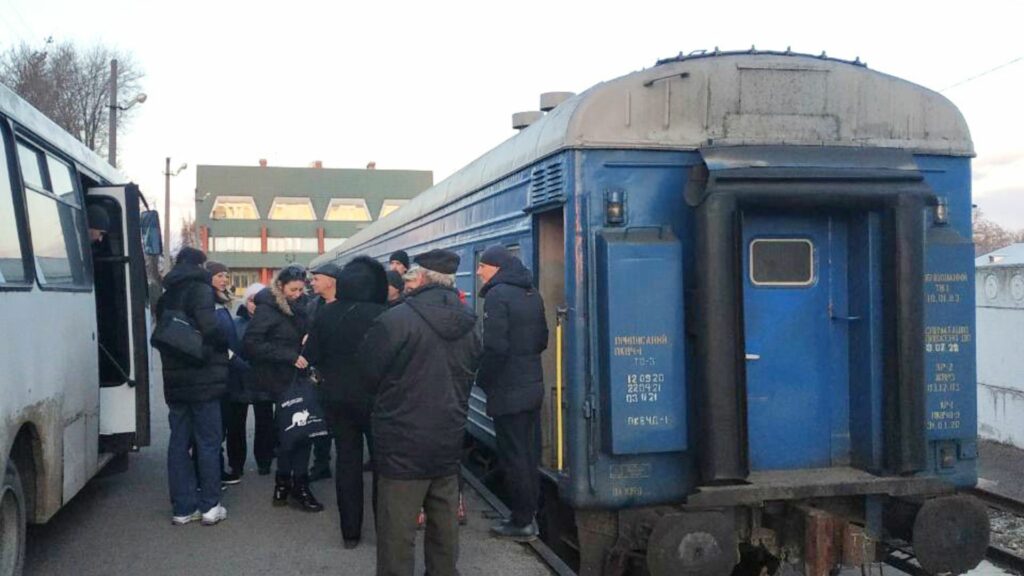
Luckily, kind Samaritans came to our aid to help us bring all the children and their luggage across through passport control. Just over the other side we were met in heated tents with hot drinks and packed lunches, brought by the Romanian team. They’d also brought thermos flasks full of hot water for baby formula, and motion sickness tablets which you just can’t get in Ukraine anymore.
We told them, “No, don’t worry. In this country, there’s no war”
After a pit stop, we drove the final hours to the reception centre prepared for us in Iași. Throughout the journey the children were asking, “Have we arrived yet? Does it have air raid sirens? Please tell us it will not have sirens?” We told them, “No, don’t worry. In this country, there’s no war”. It was very hard for them to understand that they didn’t have war after one month of conflict.
Most of the children understand very well what’s happening now back home in Ukraine, but so as not to stress them, we have said that the children of Romania have invited us to see their culture and to be their guests. They now see it more as a trip.
I really miss my country, Ukraine, but I’m really relieved that I have my own children with me in a safe country, and that I could help save these other children from the bombing. My husband insisted that that we leave Ukraine, while he stayed behind. I miss him. But here everything is good; everybody is happy to see us.
Daria Doshchuk is a regional coordinator at Hope and Homes for Children, Ukraine.
Support Ukraine Make a donation
It has been a hard journey, particularly on the brave carers and educators who have evacuated along with their families so they can continue to support these children. Any gift you make will help us continue to protect vulnerable children.
The post A Day in my Life appeared first on Hope and Homes for Children.
]]>The post Ukraine Update appeared first on Hope and Homes for Children.
]]>*Each month our teams overseas send us updates on their work. We don’t normally share these externally but the April update from our team in Ukraine is so compelling that we wanted you to see it. So you can get to know our team in their own words, we’ve only edited for understanding, so you may find some of the grammar is not perfect.
In March, there was a firm belief that this horror was about to end.
However, it did not get easier in April. It was both psychologically and physically difficult. Our social workers have already gotten used to sirens, checkpoints and cars with the words “Evacuation”, “Children”. But seeing cars with the inscriptions “300” (wounded) and “Cargo 200” (dead). The deaths of acquaintances. Answers from the services on children’s affairs: “We have a funeral today.” You do not get used to this.
Local authority social workers began to resign and leave because it became dangerous for their own children. Some moved from the border with the Donetsk region closer to Dnipro city, and some went abroad.
Those who have still stayed in workplaces, did the work of three or more specialists. Often it was just one person for a whole community. And furthermore – there were 500-800 internal refugees in settlements with a population of about 5,000 locals. People are placed in kindergartens, schools, abandoned houses, and village halls. Sometimes people come themselves, sometimes in groups by packed buses. Many were forced to leave their homes without anything, without money, and sometimes – also without documents.
A special problem arose due to the return of children to families, who had been in institutions before the war. Due to the war, these institutions were suspended, and children were forced to return to their families. Most of them had been in institutions around-the-clock. In some families, more than three children have been returned after institutions were closed, and there is, in fact, nothing even to feed them.
In total, almost 8 million people in Ukraine have been forced to leave their homes and seek refuge in other areas. This data does not take into account people who have left the country.
Our work in numbers, April 2022, Ukraine
0 1 2 3 4 5 6 7 8 9 0 0 1 2 3 4 5 6 7 8 9 0 0 1 2 3 4 5 6 7 8 9 0 0 1 2 3 4 5 6 7 8 9 0
children received assistance
0 1 2 3 4 5 6 7 8 9 0 0 1 2 3 4 5 6 7 8 9 0 0 1 2 3 4 5 6 7 8 9 0
children with disabilities supported
£ 0 1 2 3 4 5 6 7 8 9 0 0 1 2 3 4 5 6 7 8 9 0 0 1 2 3 4 5 6 7 8 9 0 0 1 2 3 4 5 6 7 8 9 0 0 1 2 3 4 5 6 7 8 9 0
spent on goods and food (1.228k UAH)
Support for families with children in the Dnipropetrovsk region
We have continued to support families left without livelihoods due to the war. However, due to the large inflow of refugees, we also provided support to families with children who were forced to flee their homes and seek refuge in the region’s communities.
Among the families who have been provided with assistance, there were:
- 28 families to whom 75 children were returned from institutions after the beginning of the war;
- 21 guardian families who take care of 59 orphans,
- 702 families raising 1,055 children, including 12 children with disabilities and 145 children under 3.
Support of families with children in the Donetsk region
Our work here (supported by UNICEF) has changed because of the war and is refocused on ensuring priority assistance to families with children. In the period 14 March to 30 April 2022, the assistance of food and hygiene products was provided to 150 families raising 302 children. Among children, there are 10 children with disabilities and 39 children under the age of 3 years old.
It should be noted that the teams in all communities of the Donetsk region have joined our work (identifying needs, purchasing, packing, and delivery to families). People work seven days a week. Specialists of centres of social services, and psychologists have all become active participants in determining the needs of families with children, and continue providing psychological and social support.
The groups of families covered by the humanitarian aid are:
- Families raising orphans and children deprived of parental care
- Families in difficult life circumstances
- Single mothers
- Large families.
It should be noted that the situation in the communities of the Donetsk region is also changing fast. There is constant shelling in suburbs, in various areas, air strikes, refugees, evacuees. However, many families with children remain in the settlements. These families are unable to leave, many have lost their jobs, and medical care is almost non-existent.
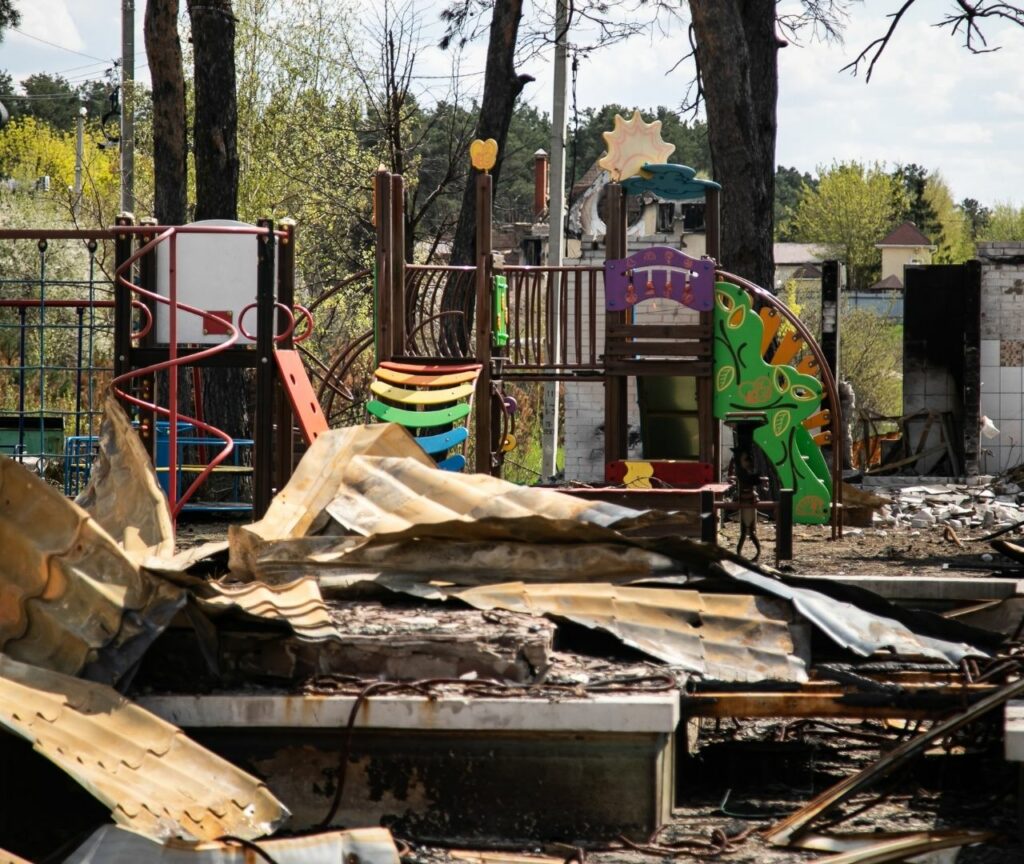
Supporting refugees
Assistance to internal migrants has become a top priority for us in Dnipropetrovsk, due to the unpreparedness for the large inflow of “refugees”, the undeveloped system of social support of the state, and the lack of other NGOs and volunteer initiatives there. A large number of remote communities noted that Hope and Homes for Children is the only organisation that helps the people in need there. From such communities, our experts constantly hear many words of gratitude for timely targeted assistance to families with children.
“Many people ‘collect the needs’ and promise to help, but only you provide a real and necessary help right now! Thank you from us and every family who received food kits! May God protect you!”
Head of one of the services on children’s affairs
The assistance is provided in combination with the provision of primary social and psychological assistance to families and children, and family counselling. It is always an individual meeting, finding out the current situation of the family, what problems the family has (medical support, counselling, referral to other services providers, informing parents, and psychological support).
Ukraine crisis appeal We need your help
By supporting our work across Ukraine, Moldova and Romania you can help protect children and families right now and in the aftermath of this war.
The post Ukraine Update appeared first on Hope and Homes for Children.
]]>The post Notes from Ukraine: A week in the warzone appeared first on Hope and Homes for Children.
]]>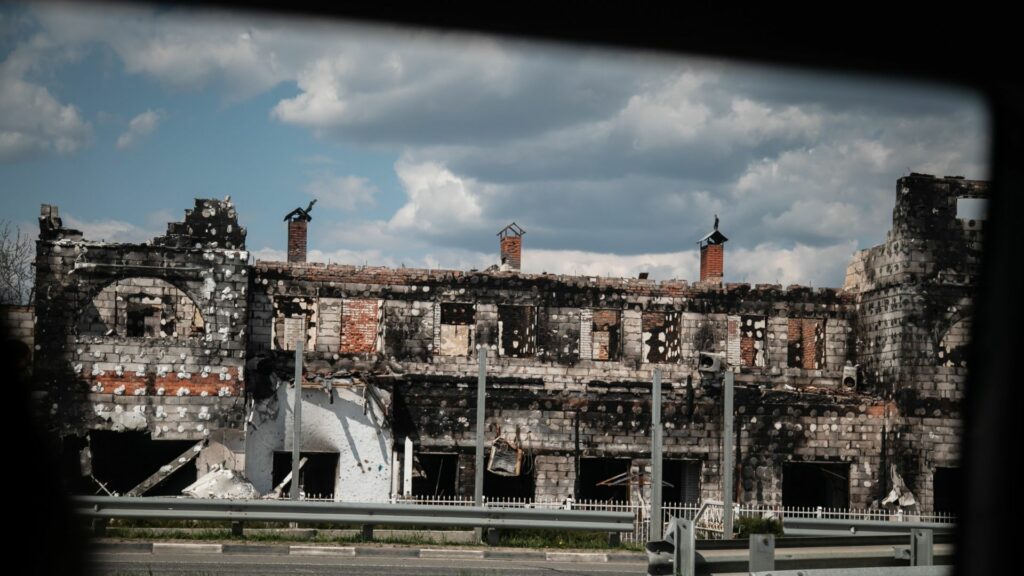
May 2nd, 2022
In Ukraine.
The damage committed by the Russians to infrastructure is widespread. In Borodianka, 98% of government buildings – schools, kindergartens, foster homes, health, administration – have been destroyed. This not only disrupts education and health services for children, it also prevents parents from getting back to work.
Our incredible team here are supporting some of the most vulnerable families with food, medicine and blankets. But the development of services that can endure over the medium to long term is important too. So, we’ve been discussing what the key needs are and how we can assist with local administrations. This will be especially important for children who are too often overlooked in humanitarian responses, like those with disabilities.
May 3rd, 2022
With Halyna, our inspirational country director, here in Ukraine.
Today we’re assessing the damage a Russian rocket wrought on a school. It ripped through a second floor classroom, utterly destroying it. Tank shells have pockmarked the football pitch. The children were still in the school but were marshalled into the basement just in time. It is a miracle that no one was killed.
Schools provide vital safe spaces and ways of including vulnerable children. The invasion turned that upside down. Online schooling is now being rolled out but access to the internet is patchy and not everyone has the kit. We’re planning to help with that.
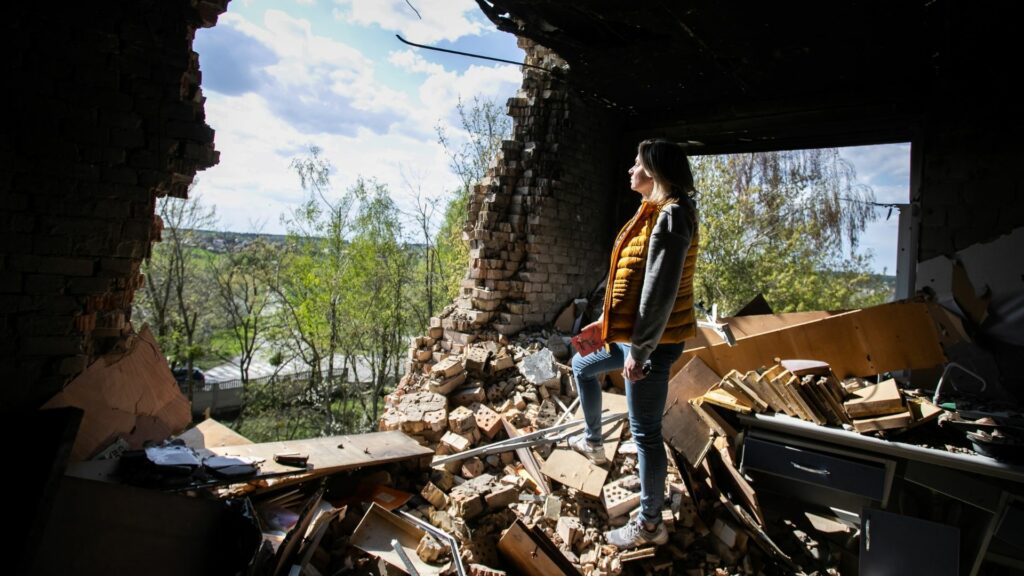
May 4th 2022
We’ve just visited a maternity unit which had experienced repeated shelling – despite the huge signs making it clear it is a hospital. New mums and babies were inside when the building came under fire. Incredibly, they managed to escape.
63,000 babies have been born since the start of the invasion. We know from Bosnia and other places that parents transmit their trauma to children, even if the child wasn’t alive during the conflict.
Older children have lived through terrifying moments themselves. Their trauma will have lifelong consequences if not attended to, making them vulnerable to being taken into care. Separated from their families.
There is a child mental health catastrophe rocketing toward us. But, we know that the trauma can be mitigated and/or prevented with the right mental health interventions.
That’s why we’re in the process of developing a mobile mental health outreach service in the worst hit towns around Kyiv. These will also provide us with a vital entry point through which to also access communities with families who need emergency provisions, like food.
The only reason we’re able to do this is because of the generous donations of our amazing supporters.
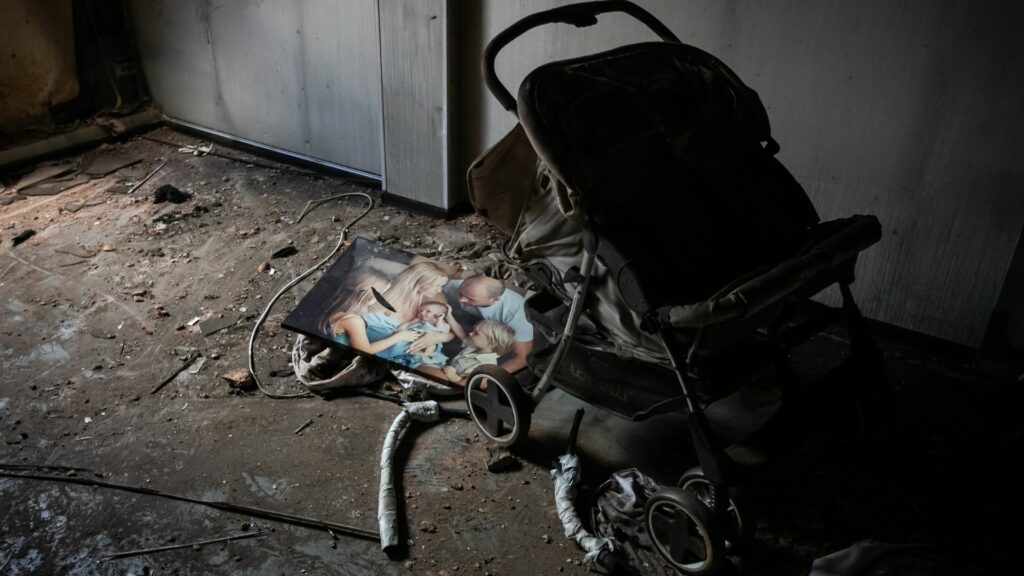
May 5 2022
In the Kyiv region, 35 communities have been levelled and 15,000 buildings destroyed. Landmines have been laid in destroyed buildings by the Russians, which are killing dozens of people who are returning to their homes.
Tracts of land in the areas we’re working in haven’t been cleared of mines yet. We’ll use the mobile units we’re developing to train teachers and raise land mine and unexploded ordnance awareness among children.
May 6 2022
Here in Ukraine, there is always hope. Despite the damage inflicted on this school in a Russian rocket attack, the words of Gandhi on the wall are inspiring: the future depends on what you do today.
Our Country Director, Halyna, and our remarkable team, have been living by these words to deliver life-saving support to the children and families most affected by the war.
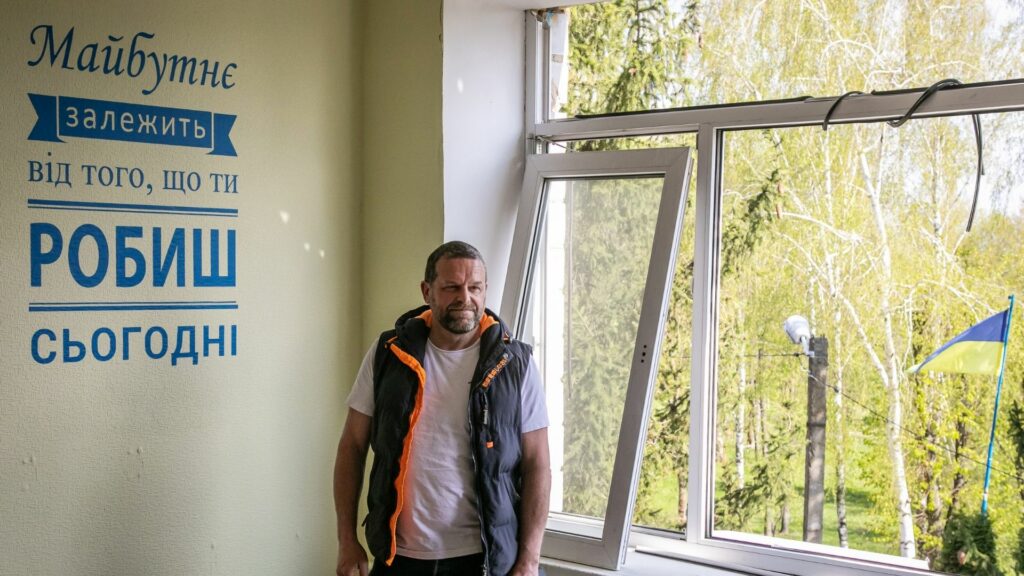
May 7 2022
Most organisations have values. At Hope and Homes for Children we have three: courage, excellence and integrity. We talk about them a lot. They guide our toughest decisions and they help encourage the best in our behaviour and actions.
These two Wonder Merchants count among the best of us. Nadia on the left. Halyna on the right. When we were in Borodianka on Monday. They live and breathe our values and their application of them is the reason how they’ve helped to save the lives of so many children.
When the world is losing itself, there are some who just step up without any fuss and stop it from tilting on its axis. Nadia, Halyna and our team here in Ukraine, are among them.
You spread hope when others might have abandoned it.
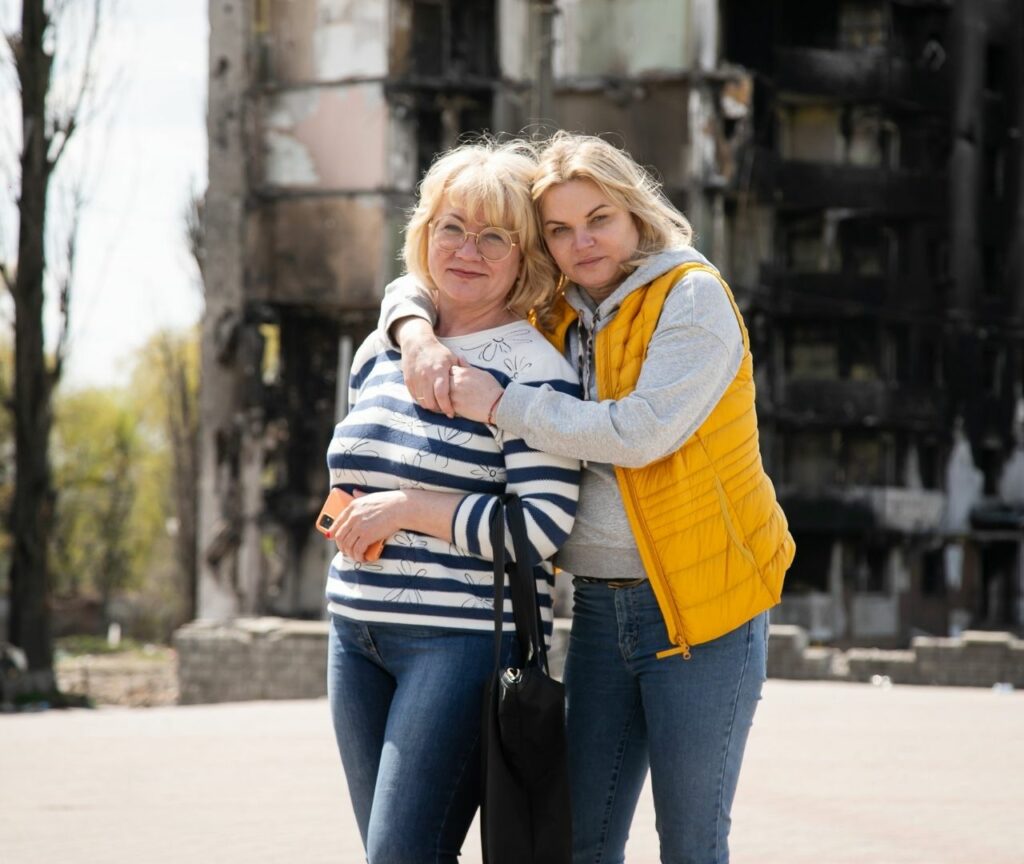
May 8 2022
Amid the destruction wrought by the Russians there are countless stories of resolve, kindness and humanity.
Ivan escaped Mariupol in a transit van with his family. They picked up another 5 families along the way – all mums with their children. Fuel is short here and they were in danger of running out before getting to safety. Ivan spotted a damaged Russian tank just off the road, hopped out of the van with a rubber hose and siphoned the diesel out of it. Our team got them all accommodation and provided them with food when they arrived in Dnipro.
Then, there’s young Dmytro, 14 years old, whose father was killed by Russian shelling and so has been caring for his mum who is living with disabilities. He had the help of his Gran. Then she died. Dmytro had to dig her grave and place her in it. No child should have to endure that. We are providing him and his mum all the support we can.
I had the privilege of meeting Lyudmila, head of the child protection department in Borodianka. The wanton murder, rape and shooting of hundreds of civilians, including children, is beyond grief. She carries this burden heavily, but with dignity and duty. Our team will be working with her to help rebuild the protection services and infrastructure that is vital in supporting families to protect and care for their children, including those with disabilities.
Our hope is that we will achieve all this by building a system that prevents children from being separated from their families and taken into care. Or, when necessary, provides them with alternative forms of family care.
We will be aiming to focus a significant part of that system on the 100,000 children associated with Ukraine’s orphanages: those still confined in them; those sent back home without any preparation or planning; and those vulnerable to being locked up in them the majority of whom have disabilities and are being punished for that.
I cann’t imagine finer humans than Lyudmila or my colleagues across Hope and Homes for Children to create the opportunity to succeed in this endeavour.
And to everyone who is supporting us. Thank you. Thank you so very much.
The post Notes from Ukraine: A week in the warzone appeared first on Hope and Homes for Children.
]]>The post Responding to the refugee crisis in Moldova appeared first on Hope and Homes for Children.
]]>With so many people arriving from Ukraine, the way we work with families has also changed. In early March, we started to shape our response to the refugee crisis.
Currently, we are helping families living in 16 refugee accommodation centres (RACs) in the northern part of Moldova. We will begin working in two more RACs in the near future.
Based on signed MoUs (Memorandum of Understanding) with local public authorities, in all 16 RACs we have provided hygiene and food supplies, focusing on more specific items such as baby food and hypoallergic food items. We have also equipped free play corners to be open around the clock for children and their families. We have set up informative corners and provided arts & crafts supplies for children.
At the end of February, the world as we know it changed.
One mom told us that reading together was a big part of her and her son’s routine when they were home. But when she left, she had not managed to pack any books. We have provided them with books to read, and drawings to look at – bringing back a small piece of normalcy for her and her son.
In another RAC in northern Moldova, a 12-year old has asked for acrylic paints so she can pursue her hobby and put in colours her emotions. She told us that her father works abroad while she, her mum and younger brother are in Moldova. She really wants to go back home to her friends and grandparents. She told her father that she is getting better at her art and she will sell some of her paintings so they get the money to go back home, and life can return to how it was before the war.
She told her father that she is getting better at her art and she will sell some of her paintings so they get the money to go back home
Some families are making longer term plans. They are planning what to do if the war continues and their home towns are not safe to return. One mum with a 15-year old plans to move out of the RAC and go to Chisinau to find work. She plans to enrol her son in a local school, mentioning that “education is the most important asset.” They will need support in finding employment, legal advice on contracting, support with school enrolment and other move-related priorities.
In some RACs, we are planning structured activities with caregivers and children to support their social-emotional development. 8 staff members have received training to do this from War Child Netherlands in TeamsUp.
Additionally to ensure integration, we plan to pilot a voucher based intervention for both refugee and host families, based on several criteria – age, disability, family size etc.
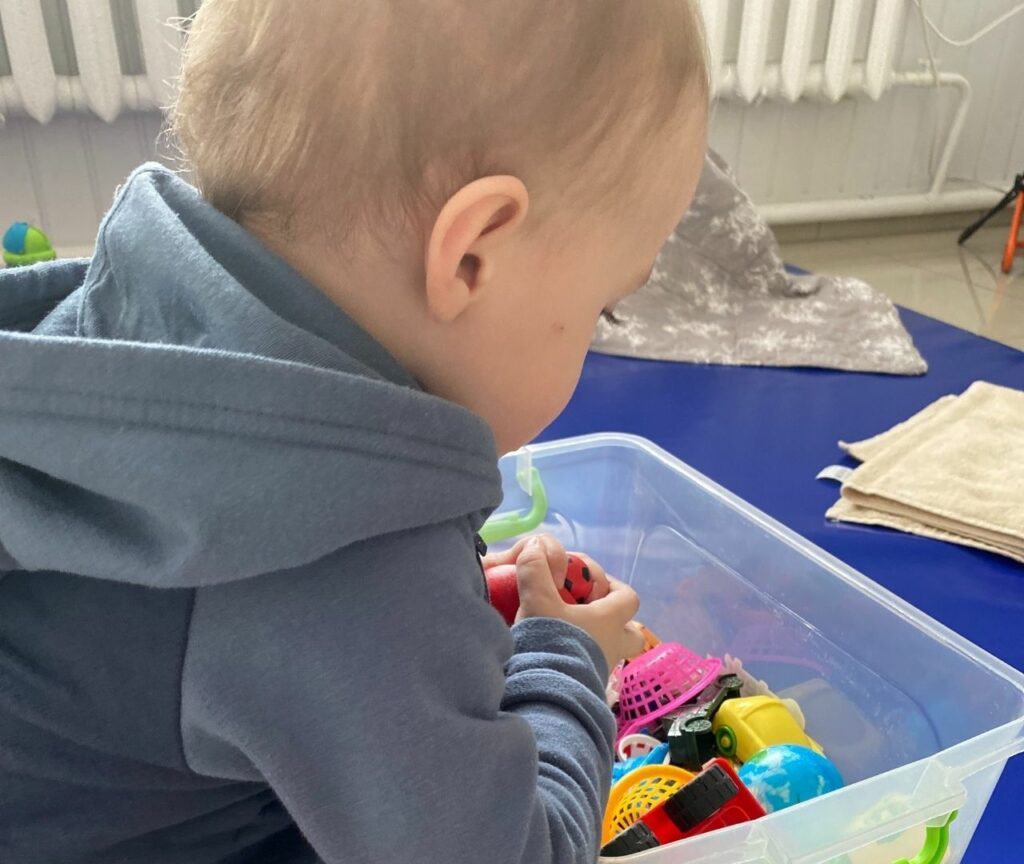
Liliana Rotaru is the chairperson of CCF Moldova, our partner organisation in Moldova.
Ukraine Crisis Appeal We Need your help
By supporting our work across Ukraine, Moldova and Romania you can help protect children and families right now and in the aftermath of this war.
The post Responding to the refugee crisis in Moldova appeared first on Hope and Homes for Children.
]]>The post Stories from Ukraine appeared first on Hope and Homes for Children.
]]>The war has caused millions of Ukrainians to flee their homes and seek refuge in areas where the situation is more or less ‘safe’.
Our team has already evacuated 63 vulnerable children and families from an orphanage in Dnipro. Staff still remain in Kyiv and Dnipropetrovsk, providing support to internally displaced persons.
So far, we have provided assistance by providing hygiene products, soft inventory (mattresses, bed linen, towels, blankets), and disposable tableware to over 100 families. These are families who have arrived in the region and without current further travel arrangements. In addition, we’ve provided assistance to over 350 refugees.
Here are the stories of some of the children and families affected.
Anna's story
"Just a month ago, we had been a happy family, had a business, a home. Now everything has changed. The shelling, sirens, fires have started. You are lying in bed and you hear the planes flying. On 4 March, our grandmother died. Old woman, darling, good. My son, who is 14 years old, had to dig her grave. She was born during the war, and died during the war. First, people were buried when there was an opportunity, where we could. Now, human bodies are lying on the streets in the open air. On 17 March 2022, we managed to get out. We are staying with relatives… sleeping on the floor, homeless."
Yuliia's story
“We survived 2014. We knew how it was. But now everything is on a much larger scale. Quite different weapons. We left in a hurry. We took a backpack with children's things and documents. I lost my job. I lost my home. I don't know what will happen to him [my husband]. I hope for the best, I hope that the children will be safe."
Oksana's story
"We were very lucky; our friend had 2 minibuses, and he wanted to take them out of the city. So my husband got behind the wheel and we left. There are 2 roads for leaving the city, and you do not know which one to choose. There was black smoke in front of us. The military said that maybe the enemies had already finished shooting, and we could take a risk that they would not shoot us. So we took the risk. Now we're living with acquaintances. There is nothing in it, but we are alive and well."
UKRAINE CRISIS APPEAL WE NEED YOUR HELP
By supporting our work across Ukraine, Moldova and Romania you can help protect children and families right now and in the aftermath of this war.
The post Stories from Ukraine appeared first on Hope and Homes for Children.
]]>The post Ways of supporting refugees in Ukraine appeared first on Hope and Homes for Children.
]]>
We are working through our local teams in Ukraine, Moldova and Romania, and advocating at global level, to help ensure the 100,000 children in orphanages across Ukraine are protected and not left behind to face this war alone. We are also working on the borders to support children and families escaping Ukraine, manning emergency reception centres and using our expertise in child protection to work with national authorities in a bid to halt a child protection crisis arising across Europe.
You can support our appeal here
Many people around the world have generously contacted us regarding fostering or adopting a Ukrainian child. However, this is not something we can facilitate. Inter-country adoptions should never take place during war, natural disaster or crisis, because they are irreversible, while family may still be traced and reunited.
Most children from Ukrainian orphanages have family members, many of whom maintain legal guardianship of their children. It is vital that every care is taken to maintain family links through documentation and on-going communication with family members as either or both relocate.
Children enter orphanages for many reasons – including poverty and lack of local medical resources. It should never be assumed that children do not have family members. In fact, around the world 80% of children have family members who could look after them with the right support. That’s why no steps should be taken that could undermine family unity.
Hope and Homes for Children supports efforts to sponsor and help refugee families. While we are not able to support with matching refugees with volunteers in the UK, we encourage you to to register with the government led ‘Homes for Ukraine’ initiative.
You can also pledge your support for the humanitarian sponsorship programme at The Sanctuary Foundation which is led by a close collaborator of Hope and Homes for Children, Krish Kandiah. The Sanctuary Foundation will share your details with Reset Communities and Refugees, an organisation that we believe will seek to match registrants with refugees as part of the government scheme.
The post Ways of supporting refugees in Ukraine appeared first on Hope and Homes for Children.
]]>The post A child protection emergency is looming in Ukraine. appeared first on Hope and Homes for Children.
]]>Before the invasion, Ukrainian children confined to institutions were already facing unacceptable neglect. Now, without a family to protect and care for them, they are facing unprecedented dangers. Many more are being torn apart from their families amid the chaos of the war.
One of our key concerns is the delay in establishing incentralised, cross-country information management system to keep track of the nearly 100.000 children from Ukrainian institutions.This lack of information is, in and on itself, life-threatening.
We are calling, along with our partners, for robust child protection mechanisms to uphold the rights of Ukrainian children deprived of family care.
Read our key recommendations below.
The post A child protection emergency is looming in Ukraine. appeared first on Hope and Homes for Children.
]]>The post Ukraine Appeal appeared first on Hope and Homes for Children.
]]>As the war in Ukraine intensifies, many people want to do something – anything – to help. By donating to our work in Ukraine, Moldova and Romania, you’ll be protecting children and families both now and in the aftermath of this war. Here are 4 ways that your support will make a difference.
The invasion of Ukraine is a crisis on many fronts. As well as the violence and bloodshed being endured by those within the country, thousands of people have already fled across the border. Already, families have been separated in the chaos, and children are travelling, unaccompanied, into foreign countries.
We are deeply concerned for the 100,000 children warehoused in Ukraine’s orphanage system. Orphanage buildings are already being targeted by shells, missiles and illegal cluster bombs. As fighting intensifies, the staff in these institutions are fleeing. Large numbers of children are being left to face the dangers of war, alone.
This brutal invasion is not only exposing children and families to unimaginable harm right now, but will continue to do so for years to come. We must act now to avert a child protection emergency across Eastern Europe.
By supporting our work across Ukraine, Moldova and Romania you can help protect children and families right now and in the aftermath of this war.
Here are 4 ways your donation will help:
1: Supporting our team in Ukraine
We have staff in Lviv, Kyiv and Dnipro.
Our teams in Lviv, Kyiv and Dnipro are providing practical, life-saving support for to thousands of vulnerable children, parents and carers. Through cash transfers and direct interventions we’ve helped families access food, water, and protection.
In Kyiv, we’re providing emergency provisions for children and parents living with disability and unable to secure essential provisions. We anticipate reaching 1,000 families (approximately 3,000 people) in the coming weeks.
In Dnipro, we’ve organised the evacuation of 63 vulnerable children, carers and their families to Iasi, Romania. This includes one child with special needs, and 7 babies. Our evacuation has ensured continuity of care for children – and is what we expect for all children.
Working with the local authorities, we remain committed to protecting these children, for as long as it takes. With the support we have received through our fundraising appeal, we plan to scale our emergency support for up to 14,000 vulnerable children, parents and carers in Ukraine.
2. Supporting our emergency response in neighbouring countries
As of 28 March 2022 we have seen over 3.9 million refugees cross the border out of Ukraine, with more than 6m displaced internally. Many of these are unaccompanied children.
In Moldova, we’ve been called on by the ministry of social protection to directly support unaccompanied children with material and emotional support. As part of a cross-organisational humanitarian effort coordinated by Unicef, we are supporting unaccompanied children and refugee families at Blue Dot emergency reception facility on the border. This work requires our team of social workers, child psychologists and admissions staff to provide round the clock care to unaccompanied children and refugee families at risk of trafficking, exploitation and other dangers. We’ve also made plans to provide up to 9,000 vulnerable children, parents and carers in Moldova, with psychological support at eight government approved emergency reception centres, alongside developing and equipping additional support services including safe spaces for mothers and babies and play environments for young children.
In Romania we’re working with UNICEF and other partners to support the emergency relief effort, as mothers, children, young people and the elderly cross the border through Sighetu Marmatiei. Alongside the provision of vitally needed essentials including sleeping bags, blankets, food and medicines we’re focusing on identifying and supporting unaccompanied children who have suffered long term institutionalisation and who are at greatest risk of exploitation and abuse.
We are also making direct interventions to support refugees and partner organisations. For example, a partner of Hope and Homes for Children Romania in Sibiu County asked for support in terms of hygiene products and baby items, as well as clothing items and toys for three groups of Ukrainian refugees that are housed in three locations belonging to the Pentecostal church (28 children in one location, 31 children in the second one and 33 children in the third one). They are accompanied by their parents and/or relatives and arrived here at the end of March.
Our Romanian colleagues anticipate an increase in traffic at secondary (i.e. Moldovan-Romanian) border points, e.g. Iași, as more people arrive from Ukraine via Moldova. As witnessed at the customs in Sighetu, more refugees now arriving are coming on foot, with plastic bags. Colleagues in both Romania and Moldova anticipate a second wave of arrivals who will need a lot more humanitarian assistance.
We’re using our expertise to make sure border crossings are as safe as they can be for vulnerable children and young people and to advocate for the safe reunification of families as soon as possible and where this is not possible, for emergency foster and family type care for children.
3. Maintaining our existing programmes
As we urgently work to meet the immediate needs of the refugee crisis, our already limited resources are being stretched. In some cases, our teams of social workers and child psychologists are leaving their own children and families to travel hundreds of kilometres from their homes so they can set up close to the border and provide desperately needed physical, emotional and psycho-social support.
However, many of the children and families in our existing programmes rely on these child protection experts for support. Before the escalation of the conflict in Ukraine, we were already providing emergency interventions for children and support for families at risk of separation. All of these children and families still need our help – and we cannot turn our backs on them.
Maintaining our existing programmes will also be vital in the aftermath of this war. Our organisation was born out of the Balkans Conflict 30 years ago – and we’ve seen the long-term effects of war on children and families. Our work will not be finished, even when news of this conflict has died down.
4. Supporting our global advocacy work
In addition to our work on the ground, we are also fighting to raise the profile of children and families with so that they are placed at the centre of the humanitarian response – including with the EU’s Civil Protection and Humanitarian Aid Operations, the UN’s Office for the Coordination of Humanitarian Affairs, and G7 countries (especially the UK Government).
Funding and humanitarian assistance will be needed at significant scale to support the protection of the children living in the 700 institutions across Ukraine.
In support of this we have:
- Written to UN OCHA to ask for their help to ensure orphanages and other residential care facilities hosting children and families are recognised and signaled as protected humanitarian spaces in the course of the conflict.
- We’re calling on governments in neighbouring countries to support refugees fleeing over the border. Families must be kept together at all costs. We must keep displaced children traveling alone out of orphanages – instead prioritising emergency foster care and family reunification.
- We have put together a set of advocacy messages on the reception and protection of refugee, unaccompanied and separated children from Ukraine coming into neighbour countries. These messages are being used by our teams in Romania and Moldova as well as at EU level to advocate for children to be reunited with families or supported through temporary foster and family like care.
- Finally, we are coordinating with other global agencies that have a presence in Ukraine to share updates on the situation on the ground, connect our Ukraine colleagues, and assess possible joint advocacy actions on children in institutions.
We are a small organisation with limited resources, but we’re uniquely placed in Ukraine, Moldova and Romania to ensure those resources, skills and expertise protect children and families right now, and in the aftermath of this war.
In the event that funds raised exceed what is needed to deliver Hope and Homes for Children immediate and longer-term response to this crisis, we will use donations where the need is greatest.
Ukraine Crisis Appeal We need your help
By supporting our work across Ukraine, Moldova and Romania you can help protect children and families right now and in the aftermath of this war.
The post Ukraine Appeal appeared first on Hope and Homes for Children.
]]>The post Protecting children in war: James Ruddy’s reflections appeared first on Hope and Homes for Children.
]]>In Sarajevo, in 1993, I saw crying babies and shivering toddlers, their lips blue with cold. They had been hiding for months in the stinking and freezing basement of the Ljubice Ivezic orphanage, as mortar rounds and cannon shells smashed into the roof and adjoining playground. Four years later, in Sierra Leone’s besieged capital, I witnessed the bewildered faces of 32 orphans who had spent four weeks fleeing through dense jungle from drug-crazed rebels who were slaughtering whole villages of innocent people.
As I watch the news from Ukraine, and see images of women and children fleeing across the border, it has been hard not to recall those similar innocent victims of distant wars. The bewildered faces are the same, along with the tears and quivering voices. But so too is the outpouring of help from volunteers offering them food, blankets and homes to share.
The bewildered faces are the same, along with the tears and quivering voices.
That is just how it was, almost three decades ago, when I joined the founders of the newly-created charity, Hope and Homes for Children, in Bosnia. They were determined to save the most vulnerable victims: the orphans. In those cataclysmic days, with missiles and bullets still killing people daily, Mark and Caroline Cook set about returning these children to relative safety.
The bewildered faces are the same, along with the tears and quivering voices.
Later on, they showed the same courage and determination to save hundreds of abandoned children housed in emergency homes in Sierra Leone. The 10-year civil war there had left more than 70,000 dead and created 2.5 million refugees. Such huge figures are difficult to visualise – especially when we remind ourselves that each one represents an individual human being, many of them young children. Each one had family and friends and hopes and dreams for the future.
Among the many stories of hope from that period was that of Tenneh, the five-year-old girl we brought to England from Freetown to have a rifle bullet removed, successfully, from her brain. And Issah, who had been badly burned by rebels before we airlifted him for life-changing plastic surgery in Norwich.
Tenneh, profoundly deaf and also blind in one eye, was a quiet and dignified child who was always amazed at the growing pile of teddies that people left for her. Issah, heavily burned on his face, chest and arms, also told of his amazement at the kindness he was being shown, far removed from the brutal year he had spent as a load-bearing slave of a rebel group.
It was the same courage and determination that saved hundreds of abandoned children who were housed in emergency homes in Sierra Leone.
And so it is now for the children of Ukraine. All of them were leading normal lives at the beginning of last week: playing with friends, learning at schools, and eating regular meals. Now all that is over. Many are left hiding in basements, their lives on pause, as the sounds of war grow ever stronger. Others are fleeing along icy roads, or standing on chaotic train platforms as their frightened mothers hope they can take them to safety.
But even more tragic are those 100,000 children trapped in Ukraine’s 600 orphanages, without a loving parent’s hand to hold or a reassuring voice to calm their tears.
Along with Mark and Caroline, I have seen the miserable coldness of such orphanages across Europe and Africa. All are slightly varied but, fundamentally, have the same dire look. In all of them, children are abandoned to dingy dormitories with paid staff providing just the basics to keep them alive.
I have seen the miserable coldness of such orphanages across Europe and Africa
That is why Hope and Homes for Children has set itself the target of closing all such institutions worldwide – and has already closed so many, releasing the children back into the loving arms of traced extended family and adoptive parents.
But in wars, like the one currently raging in Ukraine, the emergency priority now is in keeping such children safe and supporting those who will end up being orphaned and abandoned among the increasing flood of victims and refugees.
If you, like me, have been moved by the deeply depressing scenes on your television screen, please help the charity to help the helpless.
The post Protecting children in war: James Ruddy’s reflections appeared first on Hope and Homes for Children.
]]>